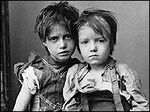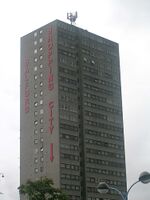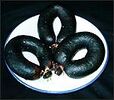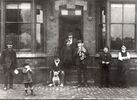Salford
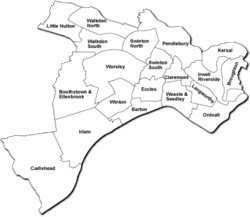 | |
| Motto: We Are Not In Fucking Manchester | |
| Settlement Type | City (honestly, it is) |
| Local Authority | Salford City Council |
| Government Type | Stalinist |
| Country | England |
| Postcode | M3 M5 M6 M7 M27 M28 M30 M50 M60 |
| Area Code(s) | 0161 |
| Religion | None, too much despair |
| Population | too many |
The City of Salford is a Metropolitan Borough of Greater Manchester, formally part of the historic county of Lancashire, but most definitely not in Manchester. If you take one thing from this article, it is that Salford is not in Manchester; your life may just depend on it as Salfordians are fiercely defensive of the fact that they are a separate city to Manchester and completely deny that they talk the same, have the same genetic abnormalities and the same penchant for criminality as the Mancunians. But they do.
Salford is also a city, I shit you not, even though it has no city centre and lacks anything that screams, “you are in a city”, apart from maybe the cathedral. It does have a university but then so does Bolton and no one has ever mistaken that for a city have they? But yes, Salford has been a city since 1926 and has a charter to prove it and everything. The realisation that Salford is a city has made many other unlikely areas to seek city status, with Alton Towers favourite to gain their charter next.
Salford’s history stretches back to the Neolithic with archaeological finds suggesting Stone Age settlement in the area. Further evidence of this can be seen in the genetic legacy bequeathed by Salfordians' cave-dwelling ancestors, e.g. the prevalence of sloping foreheads in the local populace. Modern day Salford extends to Bury and Bolton in the north, Manchester in the east, Trafford and Warrington in the south and Wigan in the west. To paraphrase the great philosopher, Al Murray, if Salford was a flat, you would never be able to sell it.
History[edit]
Pre-History & Roman Times[edit]
Humans have for some reason chosen to live in Salford for millennia. No one is quite sure why that is but evidence of settlements as far back as the Neolithic have been found.
The Romans built a road through Salford between their settlements in Manchester and Bury. The Romans never actually stopped in Salford, just passed through, a trend repeated over the centuries to this day with Salford being merely a place to pass through.
One notable find from Roman times was the preserved body of a man in one of the extensive peat bogs that Salford is built on. Dubbed “Worsley Man” he was found with a perfectly preserved kebab and a six pack of Special Brew, 5 of which were empty. Drunken accidents continue to this day to be one of the leading causes of death for Salfordians.
Industrial Revolution[edit]
With Manchester booming as the “Cottonopolis,” Salford tried to emulate this success but never quite managed it. Although more successful at spreading cholera, typhoid and syphilis than its neighbours, Salford didn’t see any of the economic development or grandiose building works that can be seen today in Manchester and Liverpool. Salford mill owners tried to sabotage their Mancunian counterparts by jamming small orphan children (known as “spanners”) into the steam engines that powered the mills, thereby stalling production. This is where the phrase “throwing a spanner in the works” comes from. Sadly, the panache of the Salford mill owners for innovative child cruelty was not enough to establish the town as an economic powerhouse and so they settled into an existence as an economic tumour on Manchester’s flank.
With the Industrial Revolution came the railways and in 1830 Salford had the honour of the first ever accident and fatality on the railways during the official opening of the Liverpool-Manchester railway. The Member of Parliament for Liverpool, Wiliam Huskisson was hit by the train and died from his injuries. It is speculated that it was not an accident and he was pushed under the train as even back then, Mancs and Scousers didn’t get on too well.
The building of the Manchester Ship Canal brought with it the establishment of the Manchester Docks in 1894. A key part was the Salford Docks which for a while led to prosperous times for Salford. This mini-boom was largely attributed to the success of prostitution that flourished in the presence of all those horny sailors.
20th Century[edit]
Salford reached a low point in the early 20th Century. Although city status was conferred upon it in 1926, a decade later, Salford boasted some of the worst slums in the country. This wasn’t as bad as it sounded though as Salford escaped the Blitzes of the Second World War virtually untouched as the Luftwaffe understandably thought that it had already been bombed.
For much of the rest of the 20th Century, Salford resembled a Brazilian Favela, albeit with less sun and more gun crime.
Geography[edit]
Half of Salford is built on a swamp, ironically, the bit that thinks it's posh. The other half is characterized by the meandering River Irwell, where the only marine life is the occasional tin can that once contained tuna. This open sewer is the training water for the university rowing team who have on occasion been sunk by bricks hurled from bridges by scallies.
Places in Salford[edit]
Although Salford is a city, it would be more accurately described as a schizophrenic amalgam of unconnected conurbations. Some of these are listed below.
Eccles[edit]
A town in its own right, Eccles does have some nice areas like Monton which is posh and unsurprisingly keeps its association with Salford quiet. Also famous for its Eccles Cake.
Broughton[edit]
Situated in the North West of the city, Broughton is a very inner city area with a large Amish population, or maybe Jewish. They have big hats and beards anyway and are annoyingly demanding.
Worsley[edit]
Whereas Eccles plays down its associations with Salford, Worsley residents are openly hostile to anyone suggesting they are part of Salford; well they are and unless there is a boundary change, they will be for the foreseeable future. Worsley is a hotbed of middle-class moaners who believe they deserve preferential treatment because of where they live. Unfortunately, the local authority panders to this frequently; meanwhile, the scummy underclass who actually need assistance are overlooked because of their inability to coherently string together a sentence. No one is quite sure why the Council falls over itself to help Worsley, most of them vote Conservative anyway and the council is Labour. Current thinking is that the City Councillors are seduced by Worsley Residents with offers of rides in Jaguars and 2-courses-for a-tenner meals at the local gastropub.
Irlam & Cadishead[edit]
Poor Irlam & Cadishead, little semi-rural idylls between Manchester and Warrington, quietly minding their own business until the slum clearances in Salford in the second half of the 20th Century turned their villages into urban overspill. Residents can still be found bemoaning the impact on property prices. Near these areas you can find Barton Aerodrome, which for some reason has been re-branded City Airport Manchester for reasons quite unknown as it only has a grass landing strip and no Tie Rack, not what anyone would call an airport.
Little Hulton[edit]
“Welcome to Dodge” the sign may have read on the A6 on the approaches to Little Hulton had it not been obscured by a giant spray-painted cock. It is not a pretty place and is a prime example if one were needed why cousins should not marry.
Swinton[edit]
When Salford became an authority, as there was no Salford City Centre, Swinton town hall was chosen to be the seat of the Salford Government. Swinton hit the headlines recently when sex-addict and former leader of the Scottish Socialists Tommy Sheridan was revealed to have visited a swingers club in Swinton called Cupids, opposite the town hall. Since the trial, a group of Councillors have offered to personally monitor the goings-on at Cupids, just to make sure everything is in order of course.
Salford Quays[edit]
Formally a toxic no-go area on the site of the old Salford Docks, the place has been given a bit of a makeover and has built shiny apartment blocks that mentally subnormal city types pay over the odds for. Also has museums and theatres. It is the closest thing Salford has to culture. The BBC will shortly be moving up to Salford Quays much to the disgust of all concerned as they have to leave their nice areas of the South East and move to Salford. You have to feel for them.
Scallies[edit]
Scallies are the underclass that make up 97.9% of the population of the city. They speak in a dialect characterised by only a passing association with consonants and the change of the ends of words ending with ‘er’ to an ‘o’ sound normally heard at the beginning of words such as otter. The result is words such as ladder changing to ladd-o. The facial shape required to produce this sound at the end of words renders the scally with the appearance of a slack-jawed hillbilly.
The main source of income for a scally comes from state benefit, petty theft and drug dealing.
The scally male will dress in a baseball cap, a black hoody with the hood up over the cap; black tracksuit bottoms tucked into black socks and black trainers. Mostly seen riding a child’s BMX bike around the streets with a spliff hanging out of the toothless mouth. For recreation, he will harass students and attempt to relieve them of their possessions.
The scally female dresses in pyjamas. She typically leaves school at 11 or 12 years old to have her first baby.
Health[edit]
The general health of Salford is not good. The average life expectancy for a male born in Salford today is 46 years, for women, 51. This is down to the average diet being exclusively kebab-based as soon as a child is weaned from the breast. Attempts to make the eating habits of Salford more healthy resulted in the burning in effigy of TV Chef Jamie Oliver and resulted in a last minute change of his Ministry of Food program from Salford to Rotherham. All Salford residents above the age of 7 smoke at least 20 cigarettes per day (no data available on the smoking habits of the under 7s) and 80% of people permanently have a blood-alcohol level such that they will never be a productive member of society.
According to the World Health Organisation, Salford has a greater incidence of sexually transmitted diseases than Sub-Saharan Africa making it the clap-capitol of the world.
Latest figures by the NHS also put Salford at the top of the league for the highest numbers of pre-teen pregnancy, even beating Austria.
Politics[edit]
Salford's Metropolitan Borough Council runs the day-to-day operations of Salford life. Swinton is where Salford City Councillors sit all day listening to gripes from the people of Worsley. Salford City Council is far left in nature and sings “Keep the Red Flag Flying” before every sitting.
Notable Salford Politicians[edit]
Rt Hon Hazel Blears MP[edit]
Ms Blears is the current MP for Salford. Her election came about after local party officials surmised that the majority of people in Salford blindly vote for the Labour Party and had a small wager that one's Jack Russell Terrier could be voted in--as such, in 1997 the bitch became an MP. During her career, Ms Blears has become exceedingly wealthy by screwing the expenses system. She can be found most nights writhing naked on her bed covered in thousands of pounds of tax-payers money.
Mr Richard Carvath[edit]
Richard Carvath is a local prospective candidate for any election that happens in the Salford area. He stands on a ticket of putting the fun back in Christian fundamentalism. He likes the Old Testament God with all that smiting, and would like to see him rain down fire and brimstone on Salford Royal Hospital for carrying out abortions. He also believes the earth is flat and gravity is an atheist lie, an assertion put to the test in June 2010 when he fell 45 feet whilst rock climbing, hilariously injuring himself. Where was your god then Carvath?
University of Salford[edit]
With a reputation for science and engineering, there has been a higher education establishment on the site since the 19th Century. It is however rare to speak to someone who says they studied at Salford, rather that they just say Manchester, leaving the implication that they studied at the University of Manchester. The main halls are located a mile away from main campus on the site of the old Manchester Racecourse. Named Castle Irwell, it has the appearance of a low security prison.
See also[edit]
